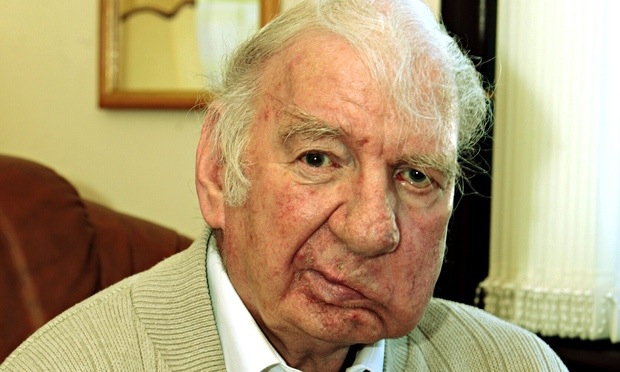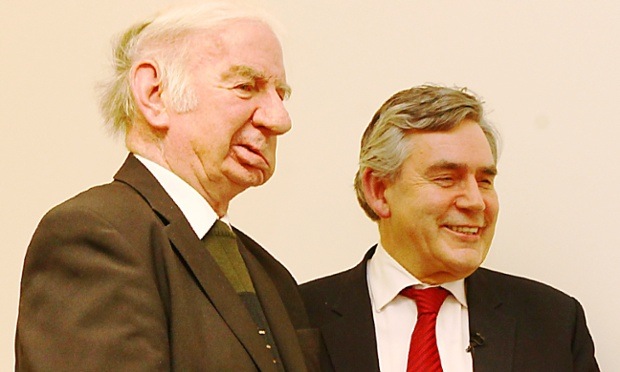
Clarke is the only self-described communist holding elected office anywhere in the UK. Although now technically an independent, Clarke has for more than 40 years sat as a communist councillor for Ballingry, a former mining town of pebbledashed terrace houses laid out on the escarpment of Benarty Hill near Cowdenbeath in Fife. The craggy-faced septuagenarian’s politics have survived the fall of the Berlin Wall, the break-up of the Soviet Union and the loss of his left ear to cancer. “I am still a communist. My beliefs haven’t changed,” the former miner says as his small grey Renault Clio trundles through the pit villages ribboned along the low hills of central Scotland.
Cowdenbeath was once the centre of the Britain’s largest mining enterprise, the Fife Coal Company. For decades, the most serious threat to Labour’s electoral supremacy here came not from Scottish nationalists, but the communists. West Fife returned Britain’s last Communist party MP, Willie Gallacher, between 1935 and 1950. A housing estate on the outskirts of Cowdenbeath with a street called Gagarin Way is nicknamed “little Moscow”.
The Communist Party of Great Britain soon declined from its postwar peak of 50,000 members and over 200 councillors. But in West Fife “the Party” remained a political force. In 1973, the Communists won 12 seats on the then Lochgelly and Cowdenbeath council. Clarke was among those elected. There is footage of him during that election night. The Communist candidate looks tired, his tie askew, his face puffy and red. But he smiles and receives the interviewer’s congratulations on his unexpected victory over the Labour incumbent in a firm, bass-heavy voice that had by then already become a fixture at miners’ rallies.
Two days after his election, Clarke received a phone call. He had to come to the Seafield Colliery right away. A roof in a steeply inclined coalface beneath the Firth of Forth had collapsed. Five miners were dead. It took rescue workers a week to reach the last three bodies. “You were away up here. And then bang, you were back to reality.” Clarke lifts his right arm in the air. The sleeve of his jumper falls away slightly to reveal a thin, bright blue scar caused by trapped coal dust in a five-decade-old wound from his own stint in the mines.
Clarke began working in the pit at 14. His first job was separating stone from coal on the surface for 40p a shift. He soon joined the Communists. “I was always rebellious. Always asking, ‘why?’. ‘Why should that happen? Why has that not happened? [The Communists] caught your imagination. They were radical, wanted change, they were not prepared to accept things as they were.”
Clarke grew up in an unconventional home. His mother was a young, unmarried domestic servant when she became pregnant. In school, classmates would tease: ‘Who is your father?’ The Clarke house, like many in the area, had a subscription to the Daily Worker and during the war his uncle, also a miner, collected short paperback biographies of Russian generals and pinned up two maps of Europe on the wall so that he and his nephew could mark the progress of the allied and axis forces.
Clarke’s uncle died in 1947. That same year, the coal industry was nationalised. Its future seemed as steadfast and dependable as the hard Fife soil on which it rested. In 1957, the Queen travelled to the Fife town of Glenrothes to open a new colliery. Mining seemed in rude health but, beneath the surface, the ground was starting to shift.
The Glenrothes colliery was a failure, and by the time it shut the following decade, mines across Scotland were being closed. In 1973, the National Union of Mineworkers declared a work-to-rule. By then most of the pits in Fife were closed. Nevertheless, Clarke and his colleague kept the communist faith.
Clarke still speaks fondly of weeks spent in Moscow at the height of the cold war. Denunciations of the Soviet Union, he maintains, were motivated by anti-communism, not a desire to shed light on repression. “They just wanted to attack it. We saw the Soviet Union as the vanguard of the working classes of the whole world.” Today, the material conditions that sustained Fife’s pit villages – and its communists – are gone. Clarke is able to win votes not because of his belief in a new socialist order but because of his tireless work for the local community.

“People like Willie, he’s a great guy and he gets things done,” says Michael Payne, who works at the Benarty community centre in Ballingry. The Benarty centre is, in part, a testimony to the ageing communist’s political effectiveness. Clarke was instrumental in securing funding for the state-of-the-art facility that replaced a series of disparate, often dilapidated facilities dotted across the pit villages.
As we sit in the centre’s cafe before one of Clarke’s weekly constituency meetings a mobility scooter silently sidles up to our table. An elderly woman in a heavy coat complains that her front door was so stiff she could barely open it. Clarke nods. He takes out a scrap of paper and a small, stubby bookmaker’s pen. (He likes a bet on the horses.) “Leave it with me, I’ll get it sorted.”
Later Clarke takes me to a picturesque lakeside park built on what was the former dump for the pits. “The Meedies” was once the largest land reclamation scheme in Europe. Now it is Fife’s most popular tourist attraction. A group of teenagers on mountain bikes cycle across what had been a rail line for coal wagons. The white wooden frame of the old pit shaft peeks out behind a smattering of trees and brambles. When the park was built many locals wanted all traces of the mines removed. Clarke successfully lobbied for the shaft to remain: “Now if you tried to take it away there’d be a revolution.”
Clarke has not lost hope of a communist insurrection, but these days his main political goal is probably more achievable: Scottish independence. In the months leading up to September’s referendum he worked flat out facilitating meetings and debates, organising canvasses and leaflet drops. “Independence will come, whether it comes now or in 20 years. It’s like the tide you cannot hold it back, it’s going to happen. People will have to look at what is going to provide a fairer society, and it’s certainly not the capitalist system.”
This piece originally appeared in the print Guardian.